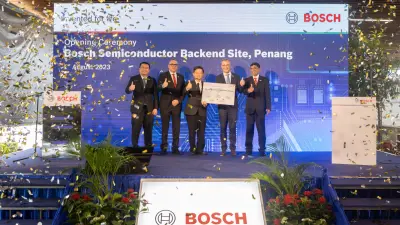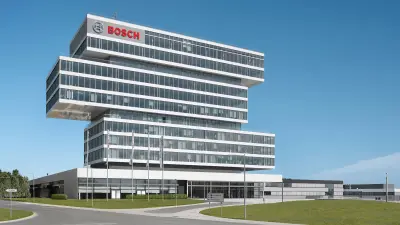Bosch opens new semiconductor backend site for chips in Penang
Total investment of EUR 350 million to strengthen the global supply chain for semiconductors

- The fully connected backend site is one of Asia’s most advanced facilities that focuses on final testing of semiconductors and sensors for mobility applications.
- Spanning a land size of 100,000 square metres, the new site covers around 18,000 square metres of clean rooms, office space, and Research and development (R&D) laboratories for up to 400 associates.
- Member of the Bosch Mobility Sector Board Klaus Maeder “The Penang backend site is a key component in Bosch’s growth strategy in the mobility sector.”
- Caretaker Chief Minister of Penang YAB Chow Kon Yeow congratulated Bosch’s 100-year anniversary in Malaysia and commended Bosch for its invaluable contribution in spearheading Penang’s industrialisation towards the Silicon Valley of the East.
- Bosch is systematically expanding its global semiconductor activities to meet global chip demand.
Penang, Malaysia – Bosch, a leading global supplier of technology and services, today officially opened one of the Asia’s most advanced semiconductor backend sites in Penang for the final testing of its automotive chips and sensors. Until the middle of the 2030s, Bosch intends to invest around 350 million EUR (RM1.62 billion) in the site. With the opening, the company continues to systematically reinforce its semiconductor business and manufacturing footprint to meet global chip demand.


The production of semiconductors can basically be divided into two sections: the so-called front-end and back-end production. With a land area of 100,000 square meters, the facility in Penang is the first of its kind in Bosch’s Southeast Asia region. It will primarily focus on the latter, which is final testing of chips manufactured at Bosch’s fab in Dresden, Germany.
YAB Chow Kon Yeow, caretaker chief minister of Penang, inaugurated the high-tech semiconductor backend site, which currently covers some 18,000 square metres and includes clean rooms, office space, and laboratories for quality assurance and manufacturing.
Datuk Wira Arham Abdul Rahman, CEO of Malaysian Investment Development Authority (MIDA); Datuk Seri Lee Kah Choon, director of Invest Penang; Dato Loo Lee Lian, CEO of Invest Penang; Dato’ Hans Peter Brenner, honorary consul of Federal Republic of Germany in Penang, as well as representatives from Bosch including Vijay Ratnaparkhe, regional president for Bosch in Southeast Asia; Klaus Landhaeusser, managing director of Bosch Malaysia; Dr. Patrick Leinenbach, senior vice president with responsibility for manufacturing semiconductor supply chain operations; Yap Thoong Poh, managing director of Bosch semiconductor backend site, Penang were also present at the event.
Malaysia, a key player in the global semiconductors market
Malaysia’s solid reputation as a key investment destination for the semiconductor industry is built on decades of manufacturing excellence and industrial experience, intellectual property (IP) protection, ease of doing business, dynamic talent pool, robust infrastructure, and strategic location.
According to local news report, Malaysia is one of the world’s 10 largest producers of semiconductor and electronic products, accounting for approximately seven per cent of the world's semiconductor trade.
Bolstering Penang as the Silicon Valley of the East
“Penang is delighted to house Bosch’s semiconductor backend site at Batu Kawan Industrial Park, which is the Group’s fourth facility in the state, following the automotive electronics, power tools, and automotive steering manufacturing plants,” said Chow. He affirmed Bosch’s close relationship with Penang and thrive to work together to accelerate Penang’s vibrant electrical and electronic (E&E) ecosystem development, anchoring its status as the Silicon Valley of the East, and ensuring beneficial economic spillovers for Malaysia.
“Bosch’s continued investment in Malaysia, is a testament to the trust and confidence built over the years. Having like-minded global partners like Bosch strengthens Malaysia’s position in global value chains and our goal to be an advanced manufacturing base in the region driven by innovation. This project is in line with the National Investment Aspirations (NIA) to make Malaysia a strategic investment hub and promote high-skilled jobs and ensure that Malaysia’s industries remain resilient and competitive,” added Datuk Wira Arham.
Bosch is systematically expanding its semiconductor activities
Malaysia is an important hub in Bosch’s global semiconductor supply chain. The country is estimated to cover around 13 percent of the global backend production. “We are further expanding the local semiconductor ecosystem and reinforcing our commitment in Malaysia amid our 100-year celebration. Our new facility in Penang brings Bosch’s global manufacturing network closer to outsourced semiconductor assembly and test vendors (OSATs) in the region as well as to our automotive customers in the Asian market,” emphasised Landhaeusser. He also thanked MIDA for their support and guidance throughout the process of setting up the new Bosch semiconductor backend site. The collaborative efforts and seamless cooperation with MIDA assumed a pivotal role in making this project a success.
With the addition of an advanced backend site in Southeast Asia, Bosch is completing its internal process chain especially for the semiconductors manufactured in Dresden, Germany. Bosch is currently carrying out the final testing of its semiconductors for the most part in Reutlingen, Germany, Suzhou, China, Hatvan, Hungary, as well as Malaysia.
The new Penang facility is expected to employ up to 400 associates by mid-2030. With a total of 4,200 associates and nearly RM400 million (86.2 million EUR) investments in Malaysia, as of December 31, 2022, Penang is home to the largest number of manufacturing facilities in a single country for Bosch in Southeast Asia.






Contact person for press inquiries:
Chan Yee En
Corporate Communications
Robert Bosch Sdn Bhd

